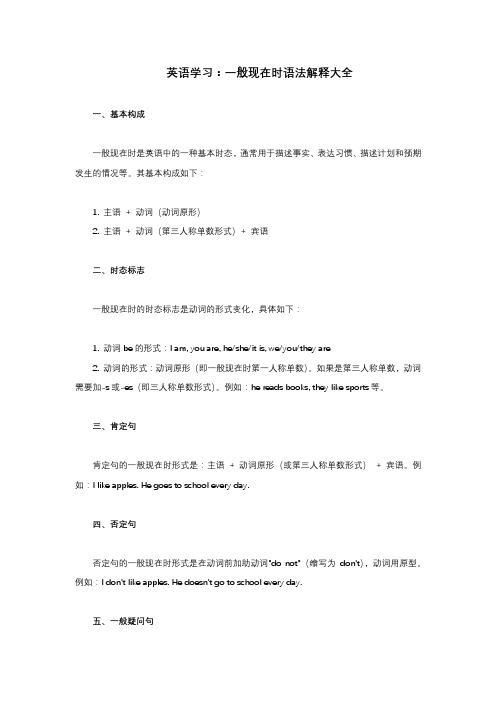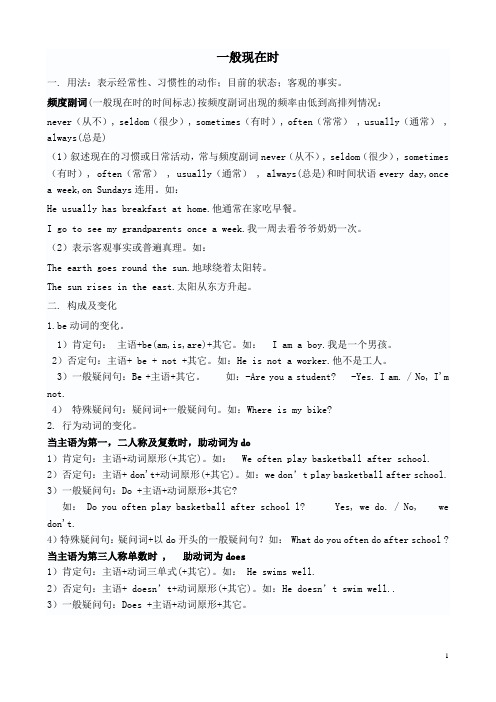一般现在时语法讲解学习
一般现在时语法讲解

一、定义与讲解一般现在时:表示经常性的事情,经常性的动作或一般性事实。
时间状语:often 经常,usually通常,always 总是,every(day, week,month,year),sometimes 有时,on weekends, at+在几点钟只有在第三人称单数用动词的“三单变化〞,其他用动词的原形。
三单变化:1.多数在动词后+s : play — plays like — likes〔1〕直接在动词词尾加-s.ask---asks work---works get---gets stay---stays〔2〕以字母s, x, ch, sh或o结尾的动词,在词尾直接加-es.watch---watches wish---wishes fix---fixes do---doesgo---goes pass---passes〔3〕以“辅音字母加- y〞结尾的动词,要先变y为i再加-es.try---tries study---studies cry---cries fly---flies情况构成方法读音例词一般情况加-s 清辅音后读/s/ 浊辅音和元音后读/z/swim-swims;help-helps;like-likes以辅音字母+o结尾的词加-es 读/z/ goes,does以s,sh,ch,x等结尾的词加-es 读/iz/ watches,washes以辅音字母+y结尾的词变y 为i再加es 读/z/ study-studies不规那么变化have和be动词变have 为has变be为am,is,arehave-has be-am,is,are2.不规那么变化:be---- am,is,are have----has二、一般现在时的用法表示经常性或习惯性的动作或存在的状态;表示客观事实或普遍真理;在时间、条件等状语从句中,用现在时表示将来;在某些以here,there开头的句子中,用一般现在时表示正在发生的动作1) 经常性或习惯性的动作,常与表示频度的时间状语连用。
英语学习:一般现在时语法解释大全

英语学习:一般现在时语法解释大全一、基本构成一般现在时是英语中的一种基本时态,通常用于描述事实、表达习惯、描述计划和预期发生的情况等。
其基本构成如下:1. 主语+ 动词(动词原形)2. 主语+ 动词(第三人称单数形式)+ 宾语二、时态标志一般现在时的时态标志是动词的形式变化,具体如下:1. 动词be的形式:I am, you are, he/she/it is, we/you/they are2. 动词的形式:动词原形(即一般现在时第一人称单数)。
如果是第三人称单数,动词需要加-s或-es(即三人称单数形式)。
例如:he reads books, they like sports等。
三、肯定句肯定句的一般现在时形式是:主语+ 动词原形(或第三人称单数形式)+ 宾语。
例如:I like apples. He goes to school every day.四、否定句否定句的一般现在时形式是在动词前加助动词"do not"(缩写为don't),动词用原型。
例如:I don't like apples. He doesn't go to school every day.五、一般疑问句一般疑问句的一般现在时形式是把助动词"do"或"does"放在句首,动词用原型。
例如:Do you like apples? Does he go to school every day?六、特殊疑问句特殊疑问句的一般现在时形式是以疑问词开头,后面接一般疑问句。
例如:What do you like? Where does he go to school?七、第三人称单数当主语是第三人称单数(he/she/it)时,动词需要变为第三人称单数形式,一般在动词后加-s或-es。
例如:he reads books, she goes to the park等。
小学语法讲解-一般现在时讲解与归纳

一般现在时一. 用法:表示经常性、习惯性的动作;目前的状态;客观的事实。
频度副词(一般现在时的时间标志)按频度副词出现的频率由低到高排列情况:never(从不), seldom(很少), sometimes(有时), often(常常) , usually(通常) , always(总是)(1)叙述现在的习惯或日常活动,常与频度副词never(从不), seldom(很少), sometimes (有时), often(常常) , usually(通常) , always(总是)和时间状语every day,once a week,on Sundays连用。
如:He usually has breakfast at home.他通常在家吃早餐。
I go to see my grandparents once a week.我一周去看爷爷奶奶一次。
(2)表示客观事实或普遍真理。
如:The earth goes round the sun.地球绕着太阳转。
The sun rises in the east.太阳从东方升起。
二. 构成及变化1.be动词的变化。
1)肯定句:主语+be(am,is,are)+其它。
如:I am a boy.我是一个男孩。
2)否定句:主语+ be + not +其它。
如:He is not a worker.他不是工人。
3)一般疑问句:Be +主语+其它。
如:-Are you a student? -Yes. I am. / No, I'm not. 4)特殊疑问句:疑问词+一般疑问句。
如:Where is my bike?2. 行为动词的变化。
当主语为第一,二人称及复数时,助动词为do1)肯定句:主语+动词原形(+其它)。
如:We often play basketball after school.2)否定句:主语+ don't+动词原形(+其它)。
如:we don’t play basketball after school. 3)一般疑问句:Do +主语+动词原形+其它?如: Do you often play basketball after school l? Yes, we do. / No, we don't. 4)特殊疑问句:疑问词+以do开头的一般疑问句?如: What do you often do after school ? 当主语为第三人称单数时 , 助动词为does1)肯定句:主语+动词三单式(+其它)。
一般现在时.语法讲解

A. have, have B. has, has
C. have, has have
D. has,
2. If their house ___ not like ours, what___ it look like?
精品课件
3. - ___ you think he will come?
ቤተ መጻሕፍቲ ባይዱ
- If it ___ tomorrow, he will not come.
I run very fast.
否定句:I don’t run very 一fa般st疑.问句:Do you run very fast ?
肯定回答:Yes, I do.
否定回答: No, I don’t.
2.e.g.
She likes Maths.
否定句:She doesn’t like Maths. 一般疑问句:Does she like Maths?
精品课件
(2).情态动词 e.g.
She can speak Chinese. 否定句:She can’t speak Chinese. 一般疑问句:Can she speak Chinese?
肯定回答:Yes, she can. 否定回答:No, she can’t.
精品课件
(3)行为动词
1.e.g.
3.My brother works in a factory.
My brother doesn’t work in a radio factory. Does your brother work精s品课i件n a radio
三、单项选择
1. The Browns ___ a nice car and Brown's brother __ a nice jeep.
一般现在时的语法知识点

一般现在时的语法知识点一般现在时是英语中最基本的时态之一,用于描述当前正在进行的动作、习惯性的行为、客观事实以及普遍真理等。
本文将介绍一般现在时的语法知识点及其应用。
一、一般现在时的构成一般现在时的肯定句结构为“主语+ 动词原形(第三人称单数加-s)+ 其他”,例如:“I eat breakfast every day.”(我每天吃早餐)否定句结构为“主语+ 动词原形+ not + 其他”,例如:“She does not like coffee.”(她不喜欢咖啡)疑问句结构为“助动词(do/does) + 主语+ 动词原形+ 其他”,例如:“Do you play football?”(你踢足球吗?)二、一般现在时的用法1. 描述习惯性的行为或经常发生的动作。
例如:“He brushes his teeth twice a day.”(他每天刷两次牙)2. 表示客观事实或普遍真理。
例如:“Water boils at 100 degrees Celsius.”(水在100摄氏度沸腾)3. 描述当前正在进行的动作。
例如:“I am studying English now.”(我现在正在学英语)4. 表示经常、总是或一直发生的动作。
例如:“She always arrives on time.”(她总是准时到达)三、一般现在时的时间状语时间状语在句子中用来表示动作发生的时间,常见的时间状语有:always(总是)、often(经常)、usually(通常)、sometimes (有时候)、every day/week/month/year(每天/每周/每月/每年)等。
例如:“I often go to the gym.”(我经常去健身房)“They usually have dinner at 7 o'clock.”(他们通常7点吃晚饭)四、一般现在时的注意事项1. 第三人称单数形式的动词要加上-s。
小学英语语法-一般现在时详细讲解

小学英语语法-一般现在时详细讲解一般现在时是英语语法中最基础也是最常用的时态之一。
它表示的是习惯性、经常性和普遍性的行为或状态。
在本文中,我将详细介绍一般现在时的形式、用法和注意事项。
一、一般现在时的形式一般现在时的肯定句的基本结构是:主语+谓语动词+其他。
谓语动词在第三人称单数形式时要加上-s或-es。
例如:- I eat breakfast every morning.(我每天早上吃早饭。
)- She goes to school by bus.(她坐公共汽车去学校。
)否定句的结构是:主语+do not/does not+动词原形+其他。
例如:- I do not like coffee.(我不喜欢咖啡。
)- He does not play football.(他不踢足球。
)疑问句的结构是:Do/Does+主语+动词原形+其他?例如:- Do you like ice cream?(你喜欢冰淇淋吗?)- Does she go to the park every weekend?(她每个周末去公园吗?)二、一般现在时的用法第1页/共4页1. 表示习惯或经常性的动作:- I write in my diary every night.(我每天晚上写日记。
)- They play basketball every Sunday.(他们每个星期天打篮球。
)2. 表示客观事实、自然规律或科学真理:- Water boils at 100 degrees Celsius.(水在100摄氏度时煮沸。
)- The sun rises in the east.(太阳从东方升起。
)3. 表示感觉、想法和喜好:- I love chocolate.(我喜欢巧克力。
)- He hates to wake up early.(他讨厌早起。
)4. 表示现时状态或现时临时的动作:- I am a student.(我是一个学生。
小学英语语法知识点一般现在时
小学英语语法知识点一般现在时一般现在时是指在说话时发生的动作或状态,或者指经常、习惯性的动作或状态。
在小学英语学习中,学生首先需要掌握的就是一般现在时的用法。
下面是一些关于一般现在时的重要语法知识点:1. 第三人称单数动词的变化:在一般现在时中,第三人称单数的动词要加上-s或-es。
例如:he plays, she eats, it runs。
2. 否定句的构成:一般现在时的否定句要在动词前加上助动词do not或does not。
例如:I do not play, he does not eat。
3. 疑问句的构成:一般现在时的疑问句要将助动词do或does放在句首。
例如:Do you play? Does he eat?4. 给第三人称单数加上-s或-es的规则:大多数动词加上-s,但是以s、x、sh、ch结尾的动词加上-es。
例如:brushes, catches。
5.一般现在时的用法:- 表示经常或习惯性的动作:I brush my teeth every morning.- 表示现在的情况或状态:She lives in Beijing.- 表示客观真理或科学事实:The sun rises in the east.- 表示将来安排的事情:The train leaves at 8 o'clock tomorrow morning.6. 表示经常或习惯性的动作时,通常会和时间状语连用,如:every day, always, often, usually等。
例如:She always goes to school by bus.7. 表示现在的情况或状态时,通常与be动词连用,如:am, is, are。
例如:I am a student.8. 表示客观真理或科学事实时,通常不和时间状语连用。
例如:Water boils at 100 degrees Celsius.9.一般现在时中的一些特殊用法:- 示意要求或建议的动词(如:want, need, like, love, hate等)后接不定式,用法类似于祈使句。
小学英语语法时态讲解与归纳一般现在时
千里之行,始于足下。
小学英语语法时态讲解与归纳一般现在时一般现在时(Simple Present Tense)是表示经常性、习惯性或普遍性的动作或状态的时态。
它用于描述我们现在经常或总是发生的动作、习惯、经验、事实和固定的真理。
下面是小学英语语法时态讲解与归纳一般现在时的内容:1. 构成一般现在时的肯定句结构为:主语 + 动词原形(第三人称单数加-s)+ 其他。
例如:- I play soccer every Saturday.(我每个星期六踢足球。
)- She eats an apple every morning.(她每天早上吃一个苹果。
)2. 第三人称单数的变化在一般现在时中,第三人称单数的动词要加上-s、-es或-ies。
例如:- She plays soccer every Saturday.(她每个星期六踢足球。
)- He eats an apple every morning.(他每天早上吃一个苹果。
)- My brother watches TV every night.(我的哥哥每天晚上看电视。
)3. 否定句和疑问句第1页/共3页锲而不舍,金石可镂。
- 否定句:在动词前加do not(don't)或does not(doesn't)。
例如:- I don't play soccer every Saturday.(我不是每个星期六踢足球。
)- She doesn't eat an apple every morning.(她不是每天早上吃一个苹果。
)- 疑问句:将助动词do(does)提到主语前。
例如:- Do you play soccer every Saturday?(你每个星期六踢足球吗?)- Does she eat an apple every morning?(她每天早上吃一个苹果吗?)4. 频率副词频率副词用来修饰动词,表示动作发生的频率。
小学英语语法_一般现在时详细讲解
变否定句
They are students. They are not students.
变否定句
She can speak English. She can not speak English.
一般现在时
(否定句)
句中没有be动词或情态动 词时,主语为第三人称单数的 否定句在动词前加does not (doesn’t),非单三时,否定 句在动词前加do not(don’例t如)
She is often late for school.
2. 表示表示客观事实
You are 13. He is a student.
You study at Olympic Garden Middle School.
3. 表示永恒不变的真理;
The moon goes round the earth.
It looks like a cat. 它看起来像只猫。
二、单个人名、地名或称呼作主 语;是第三人称单数。
①Han Mei looks like her mother. 韩梅看起来像她的母亲
②Beijing is in China. 北京在中国。 ③Uncle Wang often makes cakes.
Do+主语+动原…? Does +三单主语+动原…?
Do you go to school…?
Does he go home…?
哪些主语是第三人称单数?
一、人称代词he, she, it是第三人称单 数。
He likes watching TV. 他喜欢看电视。 She has lunch at twelve. 她十二点吃午餐。
3、实义动词第三人称单数的动词形式变化规则
英语语法解析 一般现在时的构成及用法
英语语法解析一般现在时的构成及用法1.一般现在时的构成:一般现在时主要由动词原形构成。
⑴be动词的第一人称单数形式为am,第三人称单数形式为is,其它人称都用are。
⑵动词have的第三人称单数形式为has。
⑶当主语为第三人称单数时,实义动词后一般需加s或es。
变化规则为:①一般直接加s: visit—visits, care—cares②以s, x, sh, ch,o结尾的动词,后加eswash—washes teach—teaches discuss—discusses go—goes fix—fixes③以辅音字母加y结尾的动词,变y为i再加es。
study—studies worry—worries④一般现在时的疑问句和否定句需要借助助动词do或does(be动词和have除外)He does n't like planting flowers. 他不喜欢种花。
Do you like planting flowers? 你喜欢种花吗?2. 一般现在时的用法⑴表示经常性的,习惯性的动作。
常用的时间状语有:always,usually,every day,often,never,seldom,sometimes等。
He often visits his grandparents on weekends. 他经常在周末去看望他的祖父母。
I take a walk with my husband after dinner every day. 我每天晚饭后和我丈夫散步。
⑵按照时间表,计划表等安排将要发生的动作。
常用于一些表位置移动,往返,出发,到达等含义的动词:come, go, start, begin, arrive, leave, stay等。
The next train leaves at 10:30. 下一班飞机10点半起飞。
The new term begins on September 1. 新学期9月1日开始。
- 1、下载文档前请自行甄别文档内容的完整性,平台不提供额外的编辑、内容补充、找答案等附加服务。
- 2、"仅部分预览"的文档,不可在线预览部分如存在完整性等问题,可反馈申请退款(可完整预览的文档不适用该条件!)。
- 3、如文档侵犯您的权益,请联系客服反馈,我们会尽快为您处理(人工客服工作时间:9:00-18:30)。
法语时在现般一.精品文档一般现在时一、一般现在时的定义:表示现在经常性、习惯性、规律性的动作或者现在存在的状态的一种时态。
二、一般现在时的用法例分clock every dayI get up at six )表示现在经常性、习惯性、I go to school at 7:00 every morning 律性的动I often go to school by bikeI am a teacher. /You are a student./He is a policeman.)表示主语现在的特征或状She is a doctor. /I am happy. /We are family.Mary is 12 years oldThe earth moves around the sun)表示一般性事实、客观真理Light travels faster than soun格The sun is bigger than the earthFailure is the mother of successPractise makes perfect at 8:00We are going to Shanghai, and our plane takes of表示按规定或时间表预计将4)发生的动作this afternoon, we'll have a football match.doesn't rain If it 当主句为一般将来时态时,在5)We will start as soon as you are ready.等引导的if, as soon as, until, when状语从句中用一般现在时代替一般将来时。
(主将从现)时常连用的时间状语:、习惯性的动作经常性当一般现在时表示现在always, often, usually, sometimes)表示频度的副词:1等时间状语2)on Sundays, on Monday afternoons, every day/week/month/year等表示频度的词组once a year, twice a month, threetimes a week 3)三、一般现在时的构成)+be+其他(1) 谓语动词为be (am ,is ,are) 主语I am a teacher. You are a student.He/She is a doctor.2))其他主语谓语动词为实义动词(+do/does+收集于网络,如有侵权请联系管理员删除.精品文档I like English. (Chinese,Math,Science,History,Geography,Physics,Chemistry,Sociology)English. (Chinese,Math,Science,History,Geography,Physics,Chemistry,Sociology)Mike likes Mike speaks good English.I go to school on foot (by school bus,by bus,by bike).to school on foot (by school bus,by bus,by bike).Lily goes TV in the evening.Tony often watches in cold water.Jack always washes English,Chinese,Math at school.Mike studies musical talent. Sona has四、动词第三人称单数变化规则. 可数名词单数;不可数名词▲第三人称单数:he/she/it;例动词第三人单数形streetwalkingdowntheLisa like like the sunshine enjoy enjoyand in cold water washe passeHe alwaystheTVinTonyoften watche washeeveningwatche to school on foot every dayLilyfixe goe goe Chinese for leaning moreShe studie studieculture ofChinacrieEnglish,Chinese,MathMike studie at schoolNina,shefortDotakeanynoticefor nothingalways crie musical talent ha haSona 五、句型转换1、动词谓语动词为be其他+be+not+否定:主语提到句首)be (即将be+一般疑问句:主语+其他He is 12 years olda单iis收集于网络,如有侵权请联系管理员删除.精品文档、谓语动词为实义动词2其他肯定:主语+do/does+其他否定:主语+助动词do/does+not+动词原形+其他疑问:主语+Do/Does++do/does+not.No,主语Yes,主语+do/does. 否定:回答:肯定:。
'dont 原形之后动词一定要用'和doesnt 注意::课堂练习句型转换:一.1. Lucy likes going skating with her friends._______________________________________________________否定句:with her friends.n't like going skatingLucy does___________________________________________________一般疑问句:Does Lucy like going skating with her friends ?(变成一般疑问句并否定回答)2. His watch costs 300 yuan._______________________________________________________________Does his watch cost 300 yuan ?收集于网络,如有侵权请联系管理员删除.精品文档No,it doesn't.二、用所给动词的适当形式填空。
1. We often_________(play) football in the playground.2. He _______(get) up at six o'clock.3. ________you ________(brush) your teeth every morning.4. What (do) he usually (do) after school?5. Danny _________ (study) English, Chinese, Maths, Science and Art at school.6. Mike sometimes _________(go) to the park with his sister.7. Tom ________ ( study ) English, Chinese, Maths, Science and Art at school.8. _______ Mike________(read) English every day?9. How many lessons _______your classmate_______(have) on Monday?10. What time ________his mother________(do) the housework?11. Mike _________(like) cooking.12. They ______(have) the same hobby.13. My aunt _______(look) after her baby carefully.14. You always__________ (do) your homework well.15. I __________(be) ill. I'm staying in bed.16. She __________ (go) to school from Monday to Friday.17. Liu Tao __________ (do) not like PE.18. The child often __________ (watch) TV in the evening.19. Su Hai and Su Yang __________ (have) eight lessons this term.20. What day __________ (be) it today? -It's Saturday.21. He often _______(have) dinner at home.22. Daniel and Tommy _______(be) in Class One.23. We _________(not watch) TV on Monday.24. Nick _________(not go) to the zoo on Sunday.25. They (like) the World Cup.26. What they often (do) on Saturdays?27. My parents (read) newspapers every day.28. The girl (teach) us English on Sundays.29. She and I (take) a walk together every evening.30. There (be) some water in the bottle.31. What time_________ his father_________(do) the work?32.I _______(get) up at six o'clock.33._________ you _________(brush) your teeth every morning.34. What ________ ( do ) he usually ________( do ) after school?35.How many lessons _______your classmates_______(have) on Monday?习题答案:1.play2.gets3.Do; brush4.does do5. studies6. goes7.studies8.Does ;read9.does ;have 10.does ;do11.likes 12.have 13.looks 14.do 15.am 16.goes 17.does 18.watches 19.have 20.is 21.has 22.are 23.don'twatch收集于网络,如有侵权请联系管理员删除.精品文档24.doesn't go 25.like 26.do 27.read 28.teaches 29.take 30.is 31.does do 32.get 33.Do; brush 34.does;do35.do; have收集于网络,如有侵权请联系管理员删除.。
